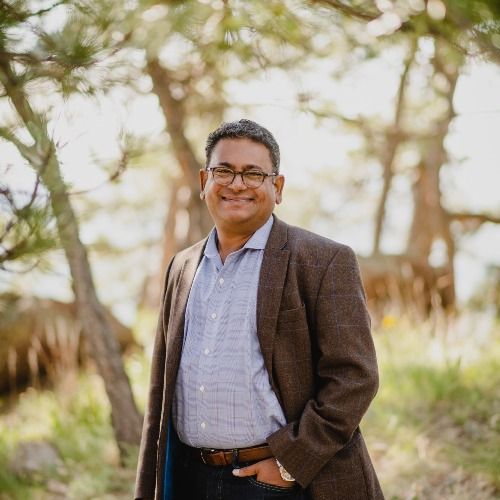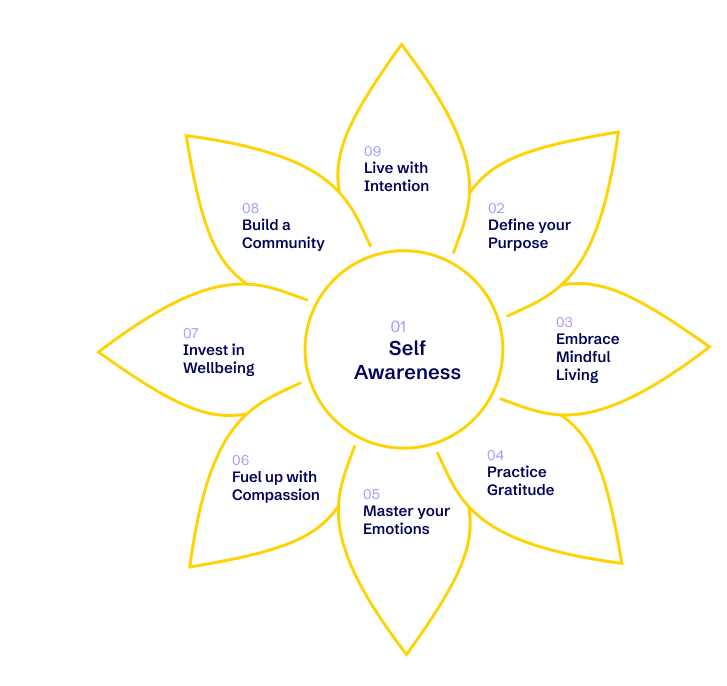Episode 112
How to Make Happiness Accessible with Ashish Kothari, Founder & CEO of Happiness Squad
We live in a world where success often leads to burnout, anxiety, and loneliness instead of fulfillment. Ashish Kothari, Founder and CEO of Happiness Squad, faced this firsthand, realizing that titles and achievements alone weren’t enough. His journey from relentless striving to meaningful happiness led him to uncover truths about well-being that many miss.
In our latest episode, Ashish shares how he founded Happiness Squad to help people find purpose, resilience, and true joy in life.
Things you will learn in this episode:
- How burnout, stress, and anxiety have become widespread challenges across industries
- The science behind individual and organizational flourishing
- Using data and continuous insights to build effective well-being programs
- Why community support and continuous practice are essential for real change
Resources:✅
• Sadhguru, Isha Foundation: https://isha.sadhguru.org/sg/en
• The Art of Living by Sri Sri Ravi Shankar: https://www.artofliving.org/in-en
• Vipassana Meditation: https://www.dhamma.org/
• Rewire Program: https://happinesssquad.com/rewire-program/
• Apple Podcast: https://podcasts.apple.com/us/podcast/the-happiness-squad/id1663683864
• Website: https://happinesssquad.com/
Books:✅
• Hardwired for Happiness: 9 Proven Practices to Overcome Stress and Live Your Best Life.https://www.amazon.com/Hardwired-Happiness-Proven-Practices-Overcome/dp/1544534655
Transcript
Ashish Kothari: Hi, my dear friends, this is Ashish Kothari, your host of the Happiness Squad Podcast. I’m also the founder and CEO of Happiness Squad, a company focused on democratizing happiness and helping a billion people integrate the science of flourishing into how they live, work, and lead.
I wanted to record this special episode to give you a little background on my origin story, how I became so passionate about human flourishing that I decided to dedicate the second half of my life to helping people live with more joy, health, love, and meaning.
The strong drive for success and perfection
My story started in India. I was blessed to have amazing parents, who I learned so much from and who were a big factor in who I am today. They were incredibly kind and caring, always followed the right path, and were also exceptionally academically gifted.
My mom was a Ph.D. in mathematics, a gold medalist in calculus. My father was at the top of his class in engineering and became a very successful banker.
When I was born, India was still a country with a fundamental mismatch between opportunities and resources. Hard work was a necessity, not just to thrive but to survive. My parents instilled this value in me from an early age.
I remember when I was seven, I had one of the most transformative experiences. I was in second grade, and back then, we had report cards with scores and percentages.
One day, I came home with a 97 out of 100 in my exams. My mom and dad were very supportive and encouraging, but they also told me that if I’d reviewed my answers, I might have gotten 100. So, they advised me to go back and review next time.
This advice was well-intentioned, meant to help me showcase my best work. But, as young people often do, I internalized a different message: success mattered, perfection mattered, and nothing less than 100 was good enough.
I came to see external success as the condition to make my parents happy, even though they never tied their love or pride to my scores. Their encouragement was simply to ensure I did my best, but I internalized it as the price I had to pay.
Early career success and personal challenges
That lesson served me well. I decided to study for the Indian Institute of Technology Exams, one of the top institutes where only 2,000 of 200,000 applicants are accepted. I managed to get in, graduated, and joined IBM.
In:Fast forward 25 years, and through all the hard work I had internalized and made a part of my identity, I reached the pinnacle of success. I started my MBA, graduated from the University of Chicago with a concentration in strategy, finance, and organizational behavior, and achieved a 4.0 GPA by working hard and going beyond what was expected.
I joined McKinsey three years after my graduation and rose quickly, making partner in six and a half years. My hustle and hard work paid off.
It was at McKinsey that I met my wife about a year or two after joining. We fell in love and have a strong relationship. We had our son a couple of years later and moved to Boulder from Chicago.
Everything in life was going well. Externally, people would say I had arrived—I was successful. Internally, however, everything was not perfect. I was struggling with anxiety, waking up every morning feeling nauseous, and, worst of all, I didn’t know why.
People offered shortcuts—seeing a therapist or a psychiatrist who could prescribe medication. But I didn’t feel that was right for me. I hadn’t experienced major trauma, and I didn’t want to numb myself through life.
So, I did what I’d always learned: when you face an obstacle, you don’t give up; you try harder. You pick yourself up, study, research, and experiment. And that’s what I decided to do, because I wanted to understand what was at the heart of my fear and anxiety.
The journey to inner development
Ashish Kothari: Friends, as they say, when the student is ready, the teacher appears, and my teachers came in the form of two amazing women I had the chance to work with at McKinsey.
One was Joan Loire, a partner in leadership development, and the other was Amy Elizabeth Fox, CEO of a leadership firm called Mobius. They created a program for senior leaders at McKinsey to help them discover their inner “why” and create a life designed from the inside out.
The program took place in an incredible monastery in Portugal, one of the oldest monasteries, filled with spiritual energy. It was there that the inspiration for the second half of my life took root.
At that point, I had been battling anxiety for about 18 months, waking up every day feeling nauseous. By the third day of the program, I woke up without anxiety for the first time. This program exposed me to some of the most powerful inner development work.
We meditated, stayed off devices, and explored the core of who we are and how our beliefs and early experiences shape us. I could feel it working.
The importance of relationships
We also worked on understanding the core of our essence, and through that, I discovered that relationships were at the heart of who I am. I’ve always been the one to connect people in ways that would benefit them. I’ve stayed in touch with all my colleagues and nearly all my clients over my entire career. Relationships have always been central to who I am.
As I looked around, I saw 25 to 30 others like me, all leading outwardly perfect lives but struggling internally with similar challenges. It was a revelation.
I realized three things: I cared deeply about relationships and people; this work was transformative and wasn’t taught in universities or leadership programs; and there was a big need for it. That’s when I decided to learn everything I could about this field and dedicate my life to it.
I dove into books—25 years later, I’m on my 685th book. I trained as an ontological coach, studied with Indian mystics like Sadhguru and Sri Sri Ravi Shankar (Art of Living), completed a 10-day Vipassana meditation, and took courses in psychology and neuroscience.
I was learning, practicing, and experimenting with techniques to foster change from the inside out. I began coaching others, designing programs for people within McKinsey, and they started seeing the impact I was experiencing. I had found my “why” and a way to help others live more fulfilling lives.
COVID-19 and the birth of Happiness Squad
Things were going great. And then, friends, COVID hit. Because of the shift I’d made from operations work to leadership, well-being, and resilience work, I had the opportunity to build, with a couple of colleagues, our offering around resilience and adaptability.
We recognized that, alongside the pandemic, a second epidemic of loneliness, anxiety, and stress was being amplified—a territory I was well familiar with from my encounter with it six years prior.
So, I decided to write a book, Hardwired for Happiness. Originally, it was titled From Fear to Freedom: A Journey from Within to Live Your Best Life, because I wanted to make these learnings accessible to everyone.
As I researched organizational stress and burnout, I was in for a shock. I realized I’d been living a lie. For six years, I believed stress, anxiety, and burnout were prices insecure overachievers paid to get rich, famous, or gain promotions.
I thought if you didn’t crave the limelight, you had a good life. But the research shook me. I discovered that stress, anxiety, and burnout were widespread, affecting 40 to 60 percent of people.
CEOs and senior executives were struggling with it, but frontline workers faced it even more. Not just those in high-stress roles like private equity, venture capital, and consulting but also teachers, doctors, therapists, and other frontline responders who weren’t in it for the money. Nonprofits were even more affected than for-profits.
When I realized the scale of this issue and the inadequacy of existing solutions, I knew I couldn’t just stand by. I decided to leave the firm and create one that could reach many more people than I could as a consultant.
Data-driven approach to well-being programs
I saw three core issues with existing programs that I wanted to address. First, most focused on individual interventions. My research made it clear that we needed to address organizational issues alongside individual ones.
So, we created two programs: REWIRE, grounded in the science of habit formation for individuals, and PEARL, focused on organizational flourishing. PEARL supports people leaders in integrating more purpose, energy, awareness, deepening relationships, and redesigning work to be neuro-friendly.
Second, I realized the power and importance of data from my years in operations transformations. Most well-being programs look at data maybe once a year and at a very high level.
In contrast, when we run factories or stores, we monitor data hourly, if not daily, at a very granular level. I knew we needed a different approach. So, I used the toolkit I’d built over my career, driving large-scale transformations and upskilling frontline employees, and applied it to flourishing.
Third, I realized this was not a quick fix. It’s a journey that takes time. Results can come quickly—as I mentioned, three days into my retreat, I was free from anxiety after 18 months of struggle—but it’s not linear. We make progress and then we fall. And it’s not a journey we can do alone.
Working in groups makes us more successful. That’s why we’ve built all our programs with a community foundation: individual programs are grounded in a community platform, and organizational programs are done with integrated teams.
I also wanted our work to help people practice, not just spread knowledge. This podcast and the experts we bring on are great sources of knowledge, but we’re continuously integrating these learnings into practice through our programs.
Joining the flourishing journey
I encourage you to join me on this journey. Keep integrating these practices, because only through practice can we rewire our neural pathways and truly become more resilient, adaptable, and happier.
That’s a bit of my origin story, and why I’m doing what I do. I’d love for you to tap into the power of flourishing—not by hustling and doing more, as I did in the first half of my life, but by truly being more.
I hope you enjoyed this episode and now understand my “why” and the work behind Happiness Squad. I’m grateful you’ve decided to join this journey and integrate this work into your life. Thank you for listening, and have a great day.



